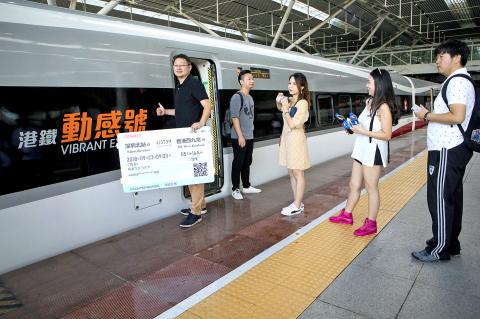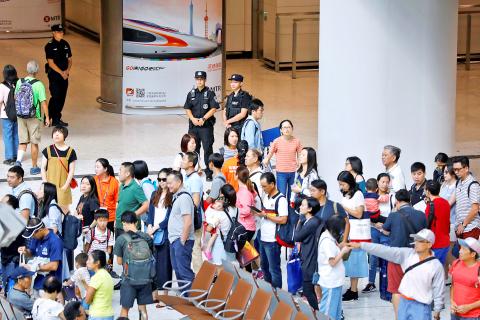Hong Kong’s controversial bullet train got off to a smooth start yesterday, as hundreds of passengers whistled north across the border at speeds of up to 200kph, deepening integration of the former British colony with China.
While the US$11 billion rail project has raised fears for some over Beijing’s encroachment on the territory’s cherished freedoms, passengers at the sleek harbor-front station were full of praise for a service that reaches China in less than 20 minutes.
“Out of 10 points, I give it nine,” said 10-year-old Ng Kwan-lap, who was traveling with his parents on the first train leaving for Shenzhen at 7am. “The train is great. It’s very smooth when it hits speeds of 200 kilometers per hour.”

Photo: Bloomberg
Chinese immigration officers are stationed in one part of the modernist station that is subject to Chinese law, an unprecedented move that some critics say further erodes the territory’s autonomy.
The project is part of a broader effort by Beijing to fuse the territory into a vast hinterland of the Pearl River Delta, including nine Chinese cities dubbed the Greater Bay Area.
Scores of excited passengers straddled a yellow strip across black tiles that highlighted the demarcation line between Hong Kong and China, while others passed through turnstiles surrounded by red, orange and white balloons.

Photo: Reuters
“I’m excited to experience the high-speed train, even more excited than when I take a plane,” said a 71-year-old retiree surnamed Leung.
The rail link provides direct access to China’s 25,000km national high-speed rail network and authorities on both sides have hailed it as a breakthrough that will bring economic benefits.
“No matter what you think about the new line, high-speed rail is extremely convenient,” said Feng Yan (馮琰), an assistant professor at the Communication University of China in Beijing who took the bullet train from Shenzhen.

CHAMPIONS: President Lai congratulated the players’ outstanding performance, cheering them for marking a new milestone in the nation’s baseball history Taiwan on Sunday won their first Little League Baseball World Series (LLBWS) title in 29 years, as Taipei’s Dong Yuan Elementary School defeated a team from Las Vegas 7-0 in the championship game in South Williamsport, Pennsylvania. It was Taiwan’s first championship in the annual tournament since 1996, ending a nearly three-decade drought. “It has been a very long time ... and we finally made it,” Taiwan manager Lai Min-nan (賴敏男) said after the game. Lai said he last managed a Dong Yuan team in at the South Williamsport in 2015, when they were eliminated after four games. “There is

Taiwan Semiconductor Manufacturing Co (TSMC, 台積電) is expected to start construction of its 1.4-nanometer chip manufacturing facilities at the Central Taiwan Science Park (CTSP, 中部科學園區) as early as October, the Chinese-language Liberty Times (the Taipei Times’ sister newspaper) reported yesterday, citing the park administration. TSMC acquired land for the second phase of the park’s expansion in Taichung in June. Large cement, construction and facility engineering companies in central Taiwan have reportedly been receiving bids for TSMC-related projects, the report said. Supply-chain firms estimated that the business opportunities for engineering, equipment and materials supply, and back-end packaging and testing could reach as high as

POWER PLANT POLL: The TPP said the number of ‘yes’ votes showed that the energy policy should be corrected, and the KMT said the result was a win for the people’s voice The government does not rule out advanced nuclear energy generation if it meets the government’s three prerequisites, President William Lai (賴清德) said last night after the number of votes in favor of restarting a nuclear power plant outnumbered the “no” votes in a referendum yesterday. The referendum failed to pass, despite getting more “yes” votes, as the Referendum Act (公民投票法) states that the vote would only pass if the votes in favor account for more than one-fourth of the total number of eligible voters and outnumber the opposing votes. Yesterday’s referendum question was: “Do you agree that the Ma-anshan Nuclear Power Plant

Democratic nations should refrain from attending China’s upcoming large-scale military parade, which Beijing could use to sow discord among democracies, Mainland Affairs Council Deputy Minister Shen You-chung (沈有忠) said. China is scheduled to stage the parade on Wednesday next week to mark the 80th anniversary of Japan’s surrender in World War II. The event is expected to mobilize tens of thousands of participants and prominently showcase China’s military hardware. Speaking at a symposium in Taichung on Thursday, Shen said that Chinese Minister of Foreign Affairs Wang Yi (王毅) recently met with Indian Prime Minister Narendra Modi during a visit to New Delhi.